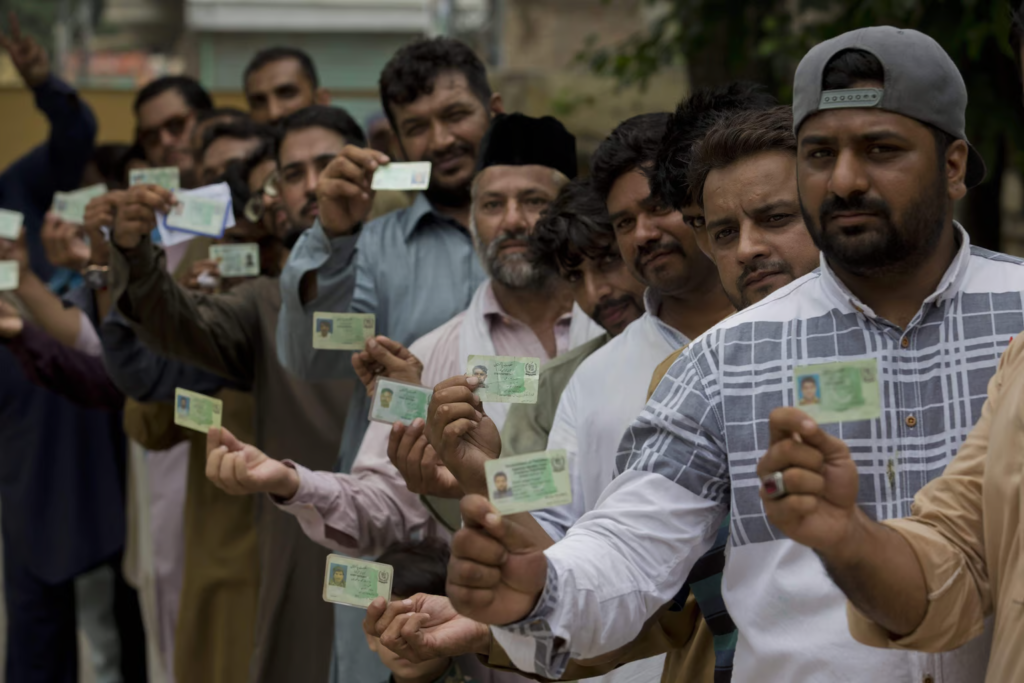A Vote Against the Establishment: Did Pakistan’s Voters Defy the Army in the Recent Elections?

Image Source: The New Indian Express
The recent Pakistani elections, held on Thursday, 8th February 2024, sent shockwaves through the nation. Imran Khan, the charismatic former cricketer turned politician, was disqualified from contesting due to alleged financial irregularities (widely seen as politically motivated), and his party, PTI, was forced to field independent candidates. Despite these challenges, and facing the combined might of the established parties and, crucially, the powerful Pakistani military allegedly backing Nawaz Sharif, the PTI (Independent) candidates emerged victorious in huge numbers, securing a majority in the National Assembly. This outcome has ignited debate about whether Pakistani voters finally defied the army’s influence in a historic act of defiance.
Independent candidates linked to the imprisoned former prime minister Imran Khan have emerged as the single biggest group in the elections. It is worth noting that Imran Khan’s association with these candidates has garnered significant attention and support. However, it is important to mention that Imran Khan himself is currently serving a prison sentence.
On the other hand, Nawaz Sharif, who is a rival of Imran Khan, has already declared himself the winner of the elections. It is interesting to observe that despite this claim, Sharif has acknowledged that his party has not yet secured enough seats to form a government independently. This highlights the need for coalition-building and alliances with other parties to establish a ruling government.
Furthermore, it is worth mentioning that Nawaz Sharif is widely perceived to be favored by Pakistan’s powerful military. This adds an additional layer of complexity to the political landscape, as the influence of the military in the country’s affairs is a significant factor to consider.
For decades, the Pakistani military has played an outsized role in the country’s politics. Accusations of direct intervention, manipulation, and even rigging of elections have been commonplace. In the lead-up to the previous 2023 polls, Khan, known for his anti-establishment rhetoric, faced increasing pressure from the military, culminating in his disqualification. This move, widely interpreted as an attempt to curb his popularity, fueled public anger and accusations of the military trying to dictate the election outcome.
Despite the odds stacked against them, the PTI’s independent candidates secured a convincing victory. This outcome can be attributed to several factors:
- Youth Vote: Khan’s message of change resonated with young voters, who make up a significant portion of the electorate and are often disillusioned with traditional politics (Reuters, 2023).
- Anti-Establishment Sentiment: The public perception of the military’s interference in the political process fueled support for Khan, seen as a challenger to the status quo.
- PTI’s Organizational Strength: Despite the disqualification, the PTI had a strong organizational network and a dedicated cadre of volunteers who mobilized the electorate (The Express Tribune, 2023).
The Outcome:
Many analysts say this is among Pakistan’s least credible elections and results have been slow to come out compared to previous votes. Usually, the results of an election are declared by midnight the same day. In this case, although the elections were over at 5PM on Thursday, the vote counting is still going on amid mounting claims of massive vote-rigging. Analysts and candidates widely questioned the integrity of the polls that took place on Thursday, raising concerns that there was an attempt to rig the vote to bring back the three-time former prime minister, Nawaz Sharif, and his Pakistan Muslim League (PML-N) to power.
As of midnight on 10th Feb, with more than half of the votes counted for the 265 seats in the national assembly, PTI-backed candidates had won 88 seats, PML-N 60, and the Pakistan People’s party 46. Many PTI leaders claimed that the actual number of seats the party had won was much higher, and there were widespread accusations of rigging as the vote count was delayed. Protests against the outcome broke out in Khyber Pakhtunkhwa and Balochistan provinces, where there are allegations of police violence, and PTI supporters also took to the streets of Lahore.
Meanwhile, Pakistan is undergoing an ongoing economic crisis, with inflation rapidly spiraling out of control at 38%, and mass power outages throughout the nation. Whoever forms the government finally, has the unenviable task of governing this mess, and take Pakistan back on the path to economic recovery.
Team Profile

- News Writer
- Shubham Chakraborty, a Freelance Writer, holds an MBA from XLRI and boasts 6.5 years of extensive corporate experience. Departing from his corporate path, he embarked on a journey to fulfill his childhood dream of focusing on writing.
Latest entries
 English12 May 2024US Likely to Impose 100% Tariff on Electric Vehicle Imports from China
English12 May 2024US Likely to Impose 100% Tariff on Electric Vehicle Imports from China English26 March 2024UN Security Council Demands Immediate Ceasefire for the First Time Amidst Ongoing Israel-Gaza Conflict
English26 March 2024UN Security Council Demands Immediate Ceasefire for the First Time Amidst Ongoing Israel-Gaza Conflict English23 March 2024Bloodbath in Moscow: ISIS-K Delivers Shocking Blow to Heart of Russia
English23 March 2024Bloodbath in Moscow: ISIS-K Delivers Shocking Blow to Heart of Russia English20 March 2024A Hollow Victory: Putin Claims Landslide in Russian Election and Scorns US Democracy
English20 March 2024A Hollow Victory: Putin Claims Landslide in Russian Election and Scorns US Democracy









